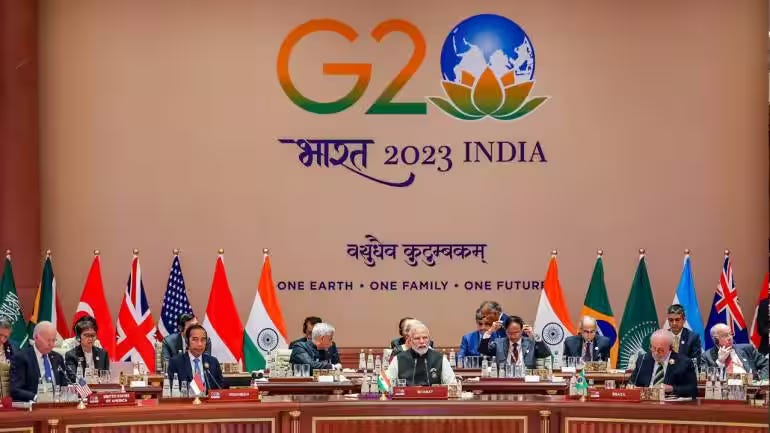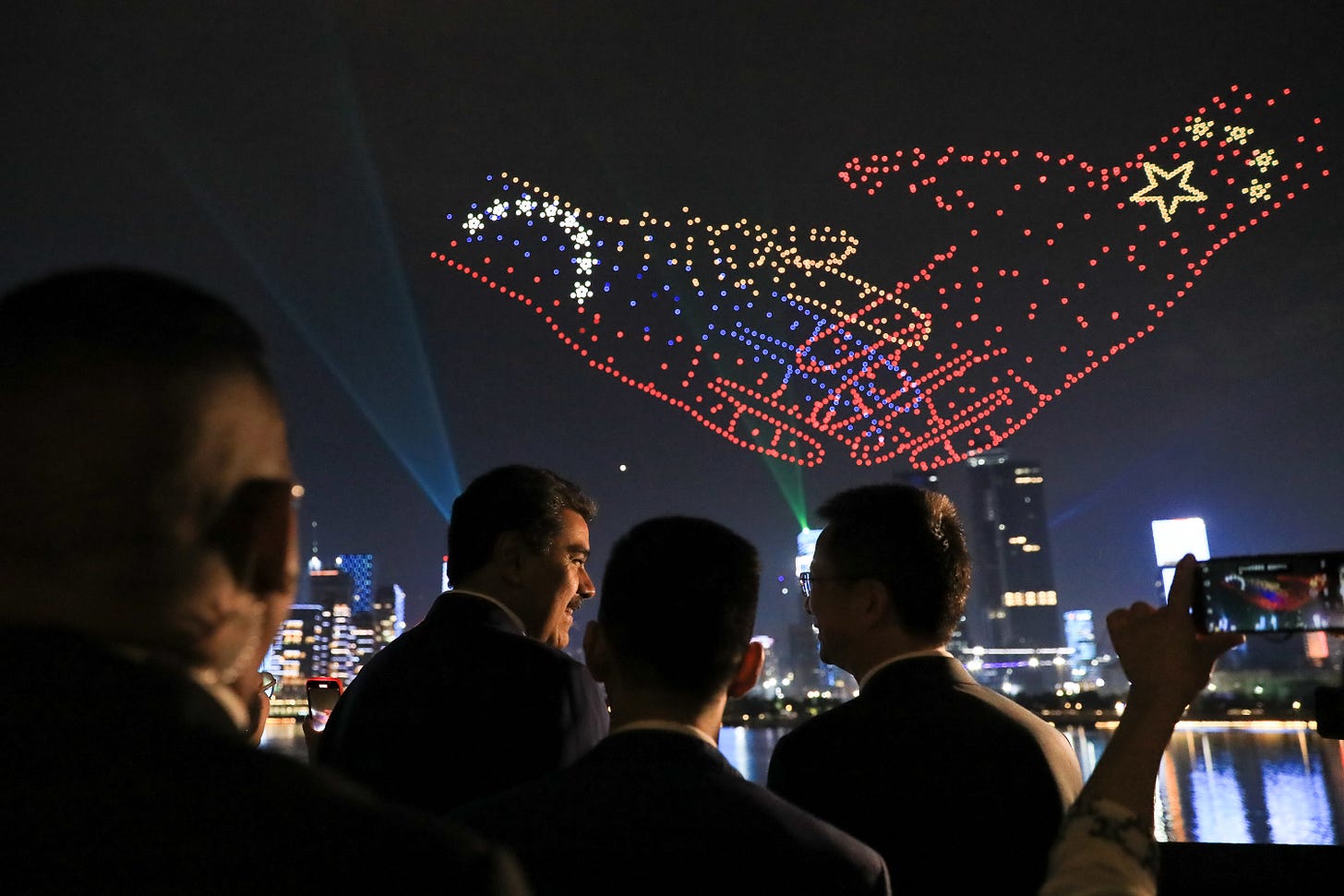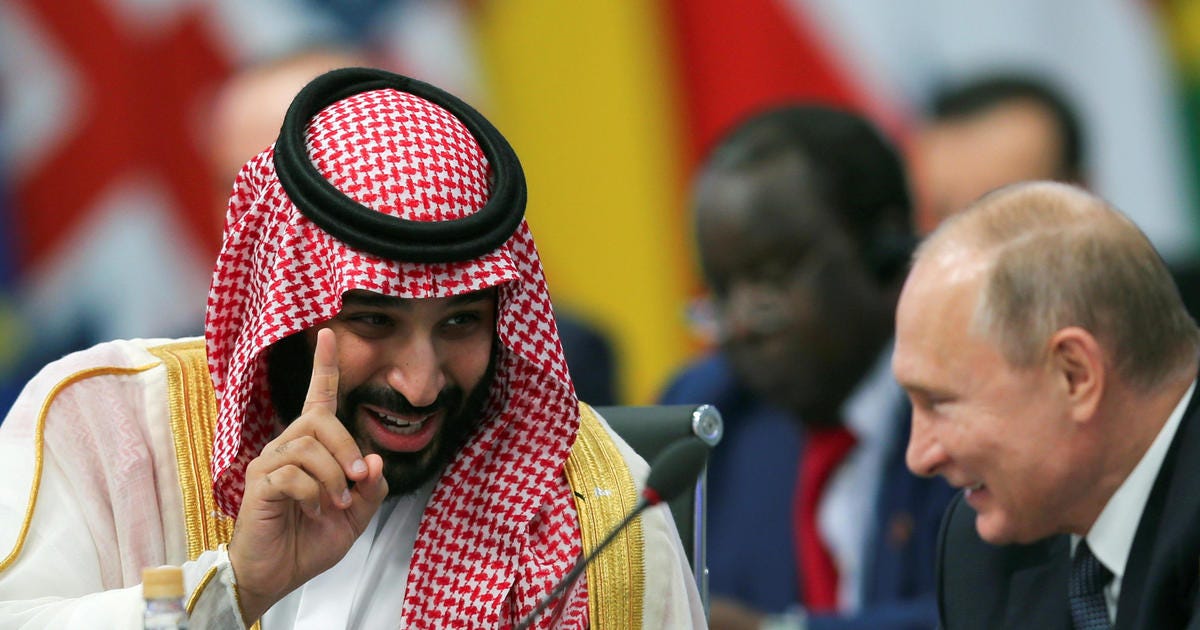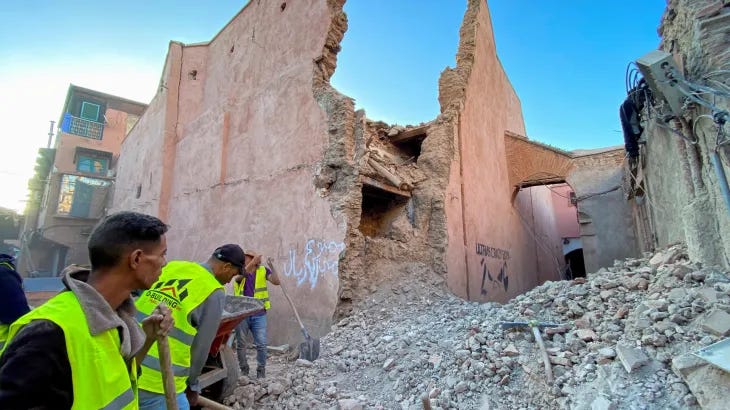This Week - G20, Maduro in China, Oil squeeze, Morocco earthquake, dollarisation.
Week of September 11th, 2023.
This week, we are starting off with the G20 summit, which has just concluded in New Delhi, India. We are also delving into discussions surrounding rising oil prices. First, we are also highlighting a couple of developments from Venezuela: Maduro is in China seeking foreign investment for a faltering oil industry and economy. There is also an interesting version circulating in Washington DC as to why Riyadh and Moscow are tightening the market.
We are bringing up news on the earthquake that recently hit Morocco, causing immense devastation. In the Central Banks section, we are making another small contribution to the debate on dollarisation and the use of emerging currencies, with the backdrop of Argentina’s election looming, and the recent BRICS summit.
We have also started publishing articles in the middle of the week which we do not send via email. Our team authors these but they were first published on other platforms. You can always read them from our page.
18th G20 Summit concludes in New Delhi

The annual G20 summit in New Delhi, India has concluded on 10 September 2023. The meeting was attended by most of the heads of state of member nations with the notable exception of Vladimir Putin (Russia) and Xi Jinping (China) who were represented by their foreign ministers. Additional attendees included Abdel Fattah El-Sisi of Egypt and Mohammed Bin Zayed Al Nahyan of the UAE. One of the most anticipated subjects of the meeting was climate change and specifically aiding developing nations in achieving their set goals to reach net zero emissions, maintain sustainable development and facilitate access to renewable energy. Towards the end of the meeting, leaders and representatives in the G20 issued a joint statement to invest in sustainable development goals and the need for countries to invest over 5 trillion dollars in the pre-2030 period to meet their objectives.
Ukraine has expressed disappointment in the joint statement surrounding the ongoing war and criticised the group for omitting Russia’s responsibility. The statement also calls on both parties to revive the Black Sea Grain to avoid a global food crisis.
African Union joins G20 as the 21st member
Another significant development of the recent G20 summit was the admission of the African Union as a new member of the group. Analysts note that the inclusion of the African Union would generate more inclusion within the G20 with the African Union representing the entire African continent and most importantly involve more African voices in the decision-making process. Before this, South Africa was the only African member of the group.
The next G20 meeting is scheduled to take place in Rio de Janeiro, Brazil and will be hosted by Lula da Silva who in recent months has pushed for Brazil’s active engagement in the international community.
Maduro visits China to seek investment

Venezuelan head of state Nicolás Maduro arrived in Shenzhen, China on September 8th, on a visit until the 14th. He is expected to meet with his Chinese counterpart, Xi Jinping. Maduro’s arrival comes straight after Vice President Delcy Rodriguez and Oil Minister Pedro Rafael Tellechea landed in Shanghai to seek new investment agreements. His visit is notably long, for almost a week. At the time of publication, Maduro was in Shandong, having just been to Shanghai where he met with the BRICS bank (NDB) chief Dilma Roussef.
According to Bloomberg, Rodriguez and Tellechea were on a mission to revive Venezuela’s run-down oil sector with Chinese investment. After picking up in the first half of 2022, the national economy has since been faltering. The delegation also visited Shanghai’s International Energy Exchange, as Caracas wishes to learn from the derivatives market looking towards implementation at home, as per a press release.
As we have been reporting, European firms Eni, Repsol, Maurel & Prom, and Shell are interested in developing Venezuela’s fossil fuel industry. Last week, Reuters reported that Shell, Trinidadian National Gas Company, and PDVSA were close to reaching a deal over the Dragon gas field. Germany’s Siemens Energy has also announced intentions to enter the sector.
$3bn humanitarian deal comes back to life
Spanish newspaper El Pais published an exclusive, whereby the deal to unlock $3bn in Venezuelan frozen assets for humanitarian purposes would be making progress. Sources had previously told Over the Hedge that this project was already dead, after it was stalled for a year. It was the result of negotiations in Mexico between the government in Caracas, the opposition, and Washington DC. The State Department feared that, if funds were unfrozen, creditors would go after them.
Given the fund failed to materialise, Maduro’s government refused to go back to the Mexico table. In fact, on August 23rd Bloomberg released a leak that it was negotiating with the Biden administration, without the opposition’s input. Rafael Guzman, who was formerly involved in the negotiations representing the party Primero Justicia, said “The Mexico negotiations are fundamental. Any economic change will need a political change”. He also doubted that Washington DC and Caracas can reach a meaningful solution without the opposition.
Saudi and Russian commitment to raise oil prices

Global oil prices have been climbing this year to highs since last autumn. The Brent crude benchmark price hit $90 a barrel, and many analysts are preparing for $100. The main driver behind this point being reached is the announcement that Saudi Arabia and Russia to maintain current output cuts. The former is slashing production by 1 mbpd and the latter by 300,000.
The leading explanation for supply cuts has been that the OPEC+ fears reduced global demand, especially given China’s relatively slower growth. Some US sources argue that Crown Prince Mohammed Bin Salman and President Vladimir Putin are attempting to put pressure on the US electorate. In this narrative, the two leaders would prefer Donald Trump to win in 2024 against President Joe Biden. This idea has some backing, given that Saudi Arabia and Russia are sacrificing the largest share of their own production to drive up prices.
Morocco hit by powerful earthquake

On 8 September 2023, Morocco was hit by a major earthquake causing massive damage and rising casualties. The 6.8 magnitude earthquake struck the Marrakesh area in western Morocco at around 11 p.m. and has so far claimed over 2,000 casualties and over 2,000 injured. The earthquake is the strongest in Morocco’s history and the deadliest since 1960. Many of the reported casualties occurred in remote parts of southern Marrakesh. Rescue efforts by emergency response units and volunteers are still ongoing.
The city of Marrakesh is known for its old city medina and its vibrant markets and is a UNESCO heritage site with an estimated population of 928,000. Several countries and organisations have since come forward to offer aid including the EU, the US and even Algeria, which had broken relations with Morocco in 2021. However, the foreign aid granted to Morocco is relatively small. Experts have also estimated that the economic losses caused by the earthquake could reach up to 2% of Morocco’s GDP, which amounts to roughly 2.8 billion USD.
The events in Morocco draw parallels with the deadly earthquake in Turkey earlier this year, as both nations are ill-equipped to handle major natural disasters. In order to avoid high casualties and destruction, countries like Turkey and Morocco will need to revise their response to natural disasters and urban development policies.
Central banks
Dollarisation in Argentina?
The electoral breakthrough of Javier Milei, Argentina’s controversial libertarian candidate, has added to debates over dollarisation in Latin America and beyond. On one hand, the region is heavily dependent on the dollar, and not just for trade. Migration and remittances have meant that greenbacks are available to the broader population. Where inflation and devaluation have hit worst, ordinary people have replaced the use of national currencies with the Fed’s, officially and unofficially. Already in Argentina, it is very common for people to save in dollar notes.
Meanwhile, there is also the backdrop of growing trade with China and deficits. In Argentina, the state – the government and the central bank – do not have enough dollars already, let alone for an ambitious dollarisation project. Analysts polled by Reuters estimated net reserves are between -$4.5bn and -$7bn, for the Banco Central de la Republica Argentina (BCRA).
According to Guido Sanderlis, who led the institution between 2018 and 2019, questioned at which exchange rate dollarisation could be carried out: “There are ARS 37 trillion, and the BCRA’s reserves are negative around USD -5 billion. Thus, dollarisation would be impossible”.
On the global scale, there is also increasing talk of “de-dollarisation”, especially as we saw the BRICS announce an expansion, and potential plans for a shared currency. What is more significant, however, is the increasing share of global trade taken up by China and other emerging economies. The basket of global currencies seems to be growing, and Argentina’s decision to pay the IMF in renminbi points in this direction. The US dollar likely has a long way to go; the British pound has gradually and slowly lost its position in global trade, even after the loss of its empire.
West African Regional Bank raises rates following recent coup in Niger
The West African Regional Central Bank which serves 8 African states (Senegal, Togo, Niger, Mali, Ivory Coast, Guinea Bissau, Burkina Faso and Benin) raised its rates by 25 basis points on 8 September 2023. Representatives of the bank cite growing regional uncertainty and inflationary pressures.






On the aid to Morocco, some sensitivities worth mentioning. Morocco accepted only 4 countries to provide aid, which are UK, Qatar, UAE and Spain. French was not invited most likley because of diplomatic tension on the Western Sahara controversial subject, but Macron is minimizing the case.